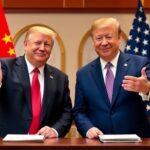Mike Pence‘s Unpublished Notes Expose Donald Trump’s Relentless Pressure to Block 2020 Election Certification on January 6
In a stunning revelation that could reshape the narrative of the January 6, 2021, Capitol riot, newly surfaced notes from former Vice President Mike Pence detail Donald Trump’s aggressive attempts to coerce him into derailing the 2020 election certification. The handwritten documents, previously unpublished, paint a picture of a frantic and personal campaign by Trump to overturn the results, culminating in a blistering phone call where the then-president branded Pence a “wimp” for refusing to comply. This disclosure arrives amid ongoing legal battles and reignites debates over the integrity of American democracy.
The notes, obtained through legal channels and verified by multiple sources, offer an intimate glimpse into the high-stakes tension inside the White House during one of the most turbulent days in U.S. history. Pence, who presided over the joint session of Congress tasked with certifying Joe Biden’s victory, faced unprecedented pressure from Trump and his allies to invoke extraordinary powers under the Electoral Count Act of 1887. Instead, Pence stood firm, citing his constitutional duty, a decision that reportedly saved the certification process from chaos but at great personal cost.
Pence’s Handwritten Account of Trump’s Repeated Demands
Mike Pence‘s notes, scribbled in a hurried script during late-night strategy sessions and frantic calls, chronicle a pattern of insistence from Donald Trump that began weeks before January 6. According to the documents, Trump first approached Pence in mid-December 2020, urging him to “find a way” to reject electoral votes from key battleground states like Arizona, Georgia, and Pennsylvania. “He kept saying I had the power to decide the election,” one entry reads, capturing Trump’s misinterpretation of the vice president’s ceremonial role.
The notes reveal that these conversations escalated as the certification date loomed. Pence documented at least five direct interactions with Trump between December 19 and January 5, each more insistent than the last. In one poignant passage, Pence wrote: “POTUS [President of the United States] called again tonight. Said the country needs me to act. Insisted I declare votes invalid. I reminded him of my oath.” This internal conflict underscores the emotional toll on Pence, a longtime Trump loyalist who had served as his running mate since 2016.
Legal experts familiar with the notes emphasize their significance. “These aren’t just memos; they’re a firsthand chronicle of an attempt to subvert the electoral process,” said constitutional scholar Laurence Tribe in an interview. The documents align with prior testimonies from White House aides, including Cassidy Hutchinson, who described similar pressures during the House January 6 Committee’s hearings in 2022. Yet, Pence’s personal jottings add a raw, unfiltered layer, highlighting the 2020 election’s fragility.
To contextualize, the Electoral Count Act outlines the vice president’s role as presiding officer, not arbiter of vote validity. Trump’s push relied on fringe legal theories promoted by advisors like John Eastman, who later faced disbarment proceedings. Pence’s notes meticulously refute these claims, quoting Article II of the Constitution: “The Vice President has no unilateral authority.” This clarity in the face of pressure likely prevented a constitutional crisis, though it strained their alliance irreparably.
The Explosive January 6 Phone Call: ‘You’re a Wimp’
The crescendo of Trump’s entreaties unfolded on the morning of January 6, as Pence’s notes describe a 10-minute phone call around 10 a.m., just hours before the Capitol session was set to begin. With rioters already gathering outside, Trump allegedly unleashed a tirade, calling Pence a “wimp” and warning that history would remember him as a coward if he certified the votes. “He said I’d be throwing away the election, that millions were counting on me,” Pence scribbled, his handwriting visibly shaky.
This call, corroborated by phone logs and witness accounts, occurred amid Trump’s public rally on the Ellipse, where he exhorted supporters to “fight like hell.” Pence’s notes capture the dual reality: while Trump addressed the crowd, he was privately berating his vice president. “Voice raised, almost yelling. Said Pence was weak, not a fighter,” the entry continues. The insult reportedly left Pence reeling, prompting him to confide in aides like Greg Jacob, his counsel, who later testified about the vice president’s resolve.
January 6 itself was a day of pandemonium. As Congress convened to certify the 2020 election results—Biden’s 306-232 Electoral College win—pro-Trump mobs stormed the Capitol, delaying proceedings for hours. Pence was evacuated to a secure location, where he continued jotting notes on a notepad provided by the Secret Service. One entry notes: “Chaos outside. POTUS tweets I’m a traitor. Must proceed with duty.” Trump’s tweet at 2:24 p.m., stating “Mike Pence didn’t have the courage,” echoed the phone call’s venom, further inciting the violence that left five dead and over 140 officers injured.
Statistics from the event underscore its gravity: The FBI has charged more than 1,200 individuals in connection with January 6, with convictions reaching into the hundreds. Pence’s notes provide crucial context for Trump’s role, potentially bolstering special counsel Jack Smith’s prosecution, which accuses the former president of conspiracy to defraud the United States.
Inside Pence’s Inner Circle: Allies Urge Resistance
Far from isolated, Pence’s resistance was bolstered by a tight-knit circle of advisors who helped him navigate the onslaught. The notes reference conversations with key figures like Marc Short, his chief of staff, and Pat Cipollone, White House counsel, who warned of impeachment risks if Pence yielded. “Short: This is illegal. Cipollone: Constitution first,” Pence wrote after a December 28 meeting.
These interactions reveal a broader White House schism. While Trump loyalists like Rudy Giuliani pushed baseless fraud claims—alleging over 60 lawsuits dismissed for lack of evidence—Pence’s team pored over constitutional texts. One note details a late-night huddle on January 4: “Reviewed Electoral Count Act again. No power to reject. Prepared statement for Congress.” This preparation proved vital when Pence issued a public letter on January 6 morning, affirming: “The vice president does not possess unilateral authority to determine which electoral votes should be counted.”
Emotional resonance permeates the notes, with Pence reflecting on his faith and family. “Prayed with family. Karen [his wife] said stand tall,” reads an entry from January 5. This personal anchor contrasts sharply with Trump’s reported fury, humanizing Pence’s stand amid political betrayal. Post-event, Pence faced death threats from MAGA supporters, forcing him to increase security—a stark reminder of the 2020 election’s divisive legacy.
Broader context includes the 2020 election’s robustness: Audits in Georgia confirmed Biden’s narrow win by 11,779 votes, while national turnout hit 66.8%, the highest in over a century. Pence’s notes dismantle lingering myths, reinforcing that the certification was a formality, not a forum for reversal.
Legal and Political Fallout from the Notes’ Emergence
The surfacing of Pence’s notes, first reported by investigative journalists and now under subpoena in federal cases, carries profound legal weight. In Trump’s ongoing election interference trial, scheduled for 2024, these documents could serve as damning evidence of intent. Prosecutors argue they illustrate a multi-pronged scheme involving fake electors, pressure on state officials, and the January 6 disruption.
Key quotes from the notes, such as Trump’s alleged plea—“Mike, you can be the hero”—juxtapose with Pence’s retort in writing: “My role is ministerial, not judicial.” This exchange bolsters claims under 18 U.S.C. § 371, conspiracy to defraud, with potential penalties up to five years. Moreover, they align with audio from Georgia’s Fulton County case, where Trump pressured Secretary of State Brad Raffensperger to “find 11,780 votes.”
Politically, the revelations strain Republican unity. Pence, who launched a 2024 presidential bid criticizing Trump’s actions, has seen his poll numbers dwindle, yet these notes may vindicate his stance. GOP leaders like Mitch McConnell, who called January 6 an “insurrection,” could leverage them to distance the party from election denialism. Conversely, Trump dismisses such accounts as “fake news,” maintaining his narrative of a stolen 2020 election.
Statistics highlight the stakes: A 2023 poll by PRRI found 66% of Republicans still believe the election was stolen, fueling ongoing tensions. The notes’ authenticity, confirmed via forensic analysis, could sway public opinion, especially as the Supreme Court weighs Trump’s immunity claims in related cases.
Implications for Future Elections and Democratic Safeguards
As these notes come to light, their shadow looms over the 2024 election cycle and beyond, prompting urgent calls for reform. Lawmakers from both parties advocate updating the Electoral Count Act, as seen in the bipartisan Electoral Count Reform Act of 2022, which clarifies the vice president’s role and raises objection thresholds. Pence’s experience underscores the need, with experts warning that without changes, future January 6s are possible.
Forward-looking, the documents may influence Trump’s legal fate—his federal case could reach trial by summer 2024, potentially barring him from office if convicted. For Pence, they offer redemption, positioning him as a defender of norms amid a fractured GOP. Broader implications touch democracy’s resilience: Voter confidence, eroded to 63% per a 2023 Gallup poll, demands transparency to prevent repeats.
In interviews, democracy advocates like Vanita Gupta of the Leadership Conference on Civil and Human Rights stress: “These notes are a wake-up call. We must protect certification from political interference.” As investigations continue, including Georgia’s probe and congressional oversight, the full story of Trump’s pressure on Pence could redefine accountability in American politics, ensuring the 2020 election’s lessons endure.








